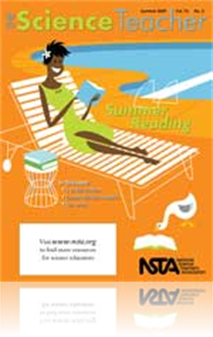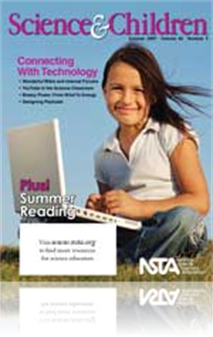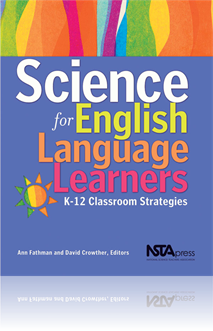All Resources
Journal Article
Reading Aloud: A Springboard to Inquiry
We may assume that high school students are too “old” to enjoy simple, juvenile reading. But reading these simple books with students not only captures their attention, but also allows them to focus on larger science concepts and can introduce th...
Journal Article
The Prepared Practitioner: Ask Questions—and Listen!
As you enjoy your summer break, are you thinking about professional development—or spending time with friends and loved ones? How about combining the activities! Conversing with friends and family offers a chance to practice questioning techniques ...
Journal Article
Scope on the Skies: Summer Skies (2009)
This summer the planet parade shifts to the morning skies as most of the visible planets are arranged over the southeastern to southwestern horizons before the Sun rises. And only one planet, Saturn, graces the evening skies. All, with the exception ...
Journal Article
What are the health risks of sun exposure—are there any benefits? Also, are some sunscreens better than others? ...
Journal Article
Editor’s Corner: Closing the Gap With Summer Reading
Among the fascinating anecdotes Gladwell offers up in his recent book, Outliers (2008), is his description of research into the socioeconomic achievement gap—why children from underprivileged families traditionally lag behind in academics. His con...
Journal Article
Safer Science: Overloading Science Labs
The current recession has brought about a wave of changes for all of us. In some school districts, boards of education are “renegotiating” areas of teachers’ contracts, including class size maximums. Science laboratories that have typically acc...
Journal Article
Every Day Science Calendar: July 2009
This monthly feature contains facts and challenges for the science explorer. ...
Journal Article
Connecting Mathematics and Science: A Learning Community That Helps Math-Phobic Students
Many undergraduate students admit to having a fear of math courses. To address this issue, the authors created a learning community that teaches math content in the context of science. This paper outlines the positive learning and dispositional resul...
Journal Article
PhUn Week: Understanding Physiology
Topics such as sports, exercise, health, and nutrition can make the science of physiology relevant and engaging for students. In addition, many lessons on these topics, such as those on the cardiovascular, respiratory, and digestive systems, align wi...
Journal Article
The Early Years: Adding Up the Rain
Having your class measure and record the amount of precipitation that falls daily is a job young children can do as part of learning about measurement and weather. Summer is a good time to prepare to teach about recording precipitation so you can beg...
Journal Article
Kyle Maynard’s book entitled No Excuses is an inspirational story that shows how a positive attitude can lead to great achievements, even when against the odds. Here the author describes how she uses Maynard’s “no excuses” philosophy as the o...
Journal Article
Every Day Science Calendar: August 2009
This monthly feature contains facts and challenges for the science explorer. ...
Journal Article
And the Winners Are… Award-Winning Science Books of 2008
Most people are probably familiar with major literary awards such as the Nobel Prize for Literature, Pulitzer Prizes, National Book Awards, Booker Prizes, and the Caldecott and Newbery awards for children’s literature. Unfortunately, few of the boo...
Journal Article
A Virtual, Shoestring Vacation
If there is a discrepancy between the scope of your imagination and the depth of your bank account, this may be the ideal summer to stretch your horizons by diving into a good book. You can take a virtual vacation to almost any place or time by readi...
Journal Article
Managing Inquiry-Based Classrooms
Though it may seem that classroom management comes naturally to some teachers, upon closer examination you’ll probably discover that preparation and adaptation are more important than any innate ability when it comes to successful classroom managem...
Journal Article
Idea Bank: Start a Classroom Library!
In today’s classrooms—science and otherwise—all teachers are charged with helping students develop literacy skills. One effective method for supporting literacy is to create your own science classroom library. These collections can encourage st...
Journal Article
When describing activities in today’s K–12 science classrooms, the word inquiry often causes some confusion. As a result, many of us find ourselves asking the same questions: How do we know when inquiry is authentic? What should happen in an inqu...
Journal Article
YouTube in the Science Classroom
YouTube makes it possible for teachers to capitalize on children’s insatiable appetite for visually stimulating learning. Some of these videos attain “viral” status, getting passed on from person to person and by links on other sites. Not only ...
Journal Article
Point of View: A Curious Thing Happened On The Way To Constructivism…
In this article, the author makes a case for including interpersonal-skill development into the instructional preparation for future professors and other educators. ...
Journal Article
Science Sampler: How to enjoy your students while your students enjoy science
Every teacher’s goal should be to create a classroom atmosphere where students know one another, feel safe both physically and emotionally, and enjoy interacting. By creating a good rapport with your students as well as a positive environment in wh...
Journal Article
Methods and Strategies: Avoiding the Big Scare
Teaching environmental issues to K–12 students is an important part of a well-rounded science education. Teaching such issues isn’t easy because some of these issues are inherently frightening. Humans certainly cause changes in their environment,...
Journal Article
The research reported here documents scientists’ changing practices and attitudes concerning college teaching. Graduate students and postdoctoral scientists participated in long-term, inquiry-based teaching professional development while maintainin...
Journal Article
Science Sampler: Teaching—A reflective process
In this article, the authors describe how they used formative assessments to ferret out possible misconceptions among middle-school students in a unit about weather-related concepts. Because they teach fifth- and eighth-grade science, this assessment...
Journal Article
Career of the Month: An Interview With Biomedical Engineer William Ditto
Biomedical engineers combine biology, physics, medicine, math, communication, and engineering to solve medical and health-related problems. Through their development of everything from pacemakers to artificial organs to computer software, these scien...
Journal Article
Introducing Scientific Writing to Students Early in Their Academic Careers
In a key activity of a scientific-writing program that has been incorporated into a 100-level chemistry course, students analyze a journal-style write-up of an experiment that requires little scientific background to understand—the baking of chocol...
Journal Article
Current Research: Summer Reading Suggestions
To supplement your summer reading, NSTA’s affiliates would like to suggest some recent articles on education research. These articles cover a variety of topics that include diversity, technology, and science teacher retention. The abstracts of thes...
Journal Article
Classroom Management: Setting Up the Classroom for Learning
Student learning is directly related to classroom control established the first week of school (Wong and Wong 2001)—what you do the first day counts, and what you do the first 10 minutes counts even more. This article shares the advanced planning a...
Journal Article
Guest Editorial: Would you like to be a student in your classroom?
Why do some teachers experience successful teaching in the middle level year after year, while others consider an eighth-grade teaching assignment equivalent to a sentence of hard labor? Why is it that some teachers and their students look forward to...
Journal Article
The start of a new school year is a challenging and exciting time for any teacher—and a time when beginning teachers particularly need our support. Working with new science teachers in the New Science Teachers’ Support Network (NSTSN) has shown t...
eBook
Science for English Language Learners: K-12 Classroom Strategies (e-book)
If you work with linguistically and culturally diverse students, you and your students will benefit from the foundation this book provides for teaching both science and language. Science for English Language Learners brings you the best practices fro...







